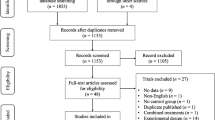Abstract
The aims of this article were to assess the methodological challenges of randomized controlled trials (RCTs) on cognitive interventions for people with multiple sclerosis, and to discuss specific problems related to rehabilitation trials. A bibliographic search was carried out. Selected articles were examined using five methodological quality criteria related to description of the target population, method of allocation, masking of patient and examiner, the outcome measures and analysis. A total of 12 RCTs, published between 1996 and 2010, were found. Five RCTs were on drug therapy (two on disease-modifying therapies, one on donepezil and two on drugs for fatigue). Seven RCTs were on rehabilitation (six on PC-based retraining techniques). The quality of the studies was overall low, inadequate selection of the target population and limited study size being the most frequent limitations. No clear improvement was found in the most recent studies. Additional methodological problems specific to rehabilitation trials are difficulties in defining and reproducing the study intervention.

Similar content being viewed by others
References
Verhagen AP, de-Vet HCW, de-Bie RA et al (1998) The Delphi list: a criteria list for quality assessment of randomized clinical trials for conducting systematic reviews developed by Delphi consensus. J Clin Epidemiol 51:1235–1241
Weinstein A, Schwid SIL, Schiffer RB et al (1999) Neuropsychologic status in multiple sclerosis after treatment with glatiramer. Arch Neurol 56:319–324
Fischer JS, Priore RL, Jacobs LD et al (2000) Neuropsychological effects of interferon B-1a in relapsing multiple sclerosis. Ann Neurol 48:885–892
Smits RC, Emmen HH, Bertlesmann FW et al (1994) The effects of 4-aminopyridine on cognitive function in patients with multiple sclerosis. Neurology 44:1701–1705
Geisler MW, Sliwinski M, Coyle PK et al (1996) The effects of amantadine and pemoline on cognitive functioning in multiple sclerosis. Arch Neurol 53:185–188
Krupp LB, Christdoulou C, Melville RN et al (2004) Donepezil improved memory in multiple sclerosis in a randomized controlled trial. Neurology 63:1579–1585
Jønsson A, Korfitzen EM, Heltberg A et al (1993) Effect of neuropsychological treatment in patients with multiple sclerosis. Acta Neurol Scand 88:394–400
Mendozzi L, Pugnetti L, Motta A et al (1998) Computer-assisted memory retraining of patients with multiple sclerosis. Neurol Sci 19:S431–S438
Lincoln NB, Dent A, Harding J et al (2002) Evaluation of cognitive assessment and cognitive intervention for people with multiple sclerosis. J Neurol Neurosurg Psychiatry 72:93–98
Solari A, Motta A, Mendozzi L et al (2004) Computer-aided retraining of memory and attention in people with multiple sclerosis: a randomized, double-blind controlled trial. J Neurol Sci 222:99–104
Chiaravalloti ND, DeLuca J, Moore NB, Ricker JH (2005) Treating learning impairments improves memory performance in multiple sclerosis: a randomized clinical trial. Mult Scler 11:58–68
Hildebrandt H, Lanz M, Hahn HK et al (2007) Cognitive training in MS: effects and relation to brain atrophy. Restor Neurol Neurosci 25:33–43
Mattioli F, Stampatori C, Zanotti D et al (2010) Efficacy and specificity of intensive cognitive rehabilitation of attention and executive functions in multiple sclerosis. J Neurol Sci 288:101–105
Kenneth F, Schulz KF, Altman DG, Moher D, for the CONSORT Group (2010) CONSORT 2010 Statement: updated guidelines for reporting parallel group randomised trials. BMJ 340:c332
Boutron I, Moher D, Altman DG, Schulz KF, Ravaud P, for the CONSORT Group (2008) Extending the CONSORT statement to randomized trials of nonpharmacologic treatment: explanation and elaboration. Ann Intern Med 148:295–309
Medical Research Council (2000) A framework for development and evaluation of RCTs for complex interventions to improve health. Medical Research Council, London
Medical Research Council (2008) Developing and evaluating complex interventions: new guidance. Medical Research Council, London
Conflict of interest statement
The author declares that she has no conflict of interests related to the publication of this article.
Author information
Authors and Affiliations
Corresponding author
Rights and permissions
About this article
Cite this article
Solari, A. Methodological aspects of randomized controlled trials on cognitive interventions. Neurol Sci 31 (Suppl 2), 279–282 (2010). https://doi.org/10.1007/s10072-010-0375-5
Published:
Issue Date:
DOI: https://doi.org/10.1007/s10072-010-0375-5




